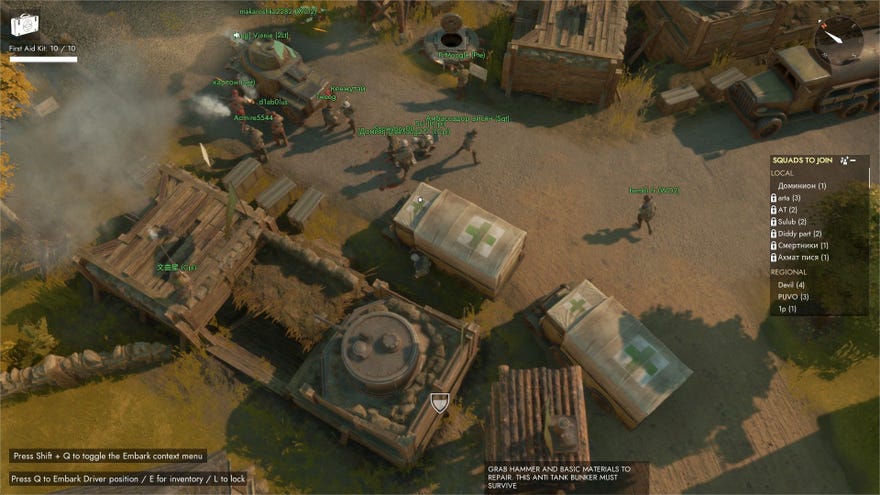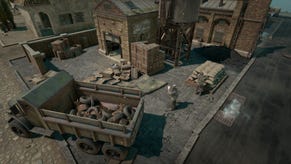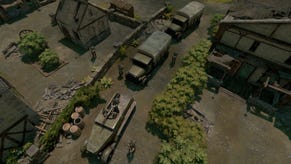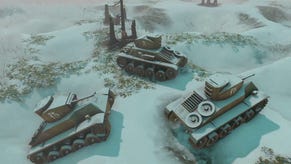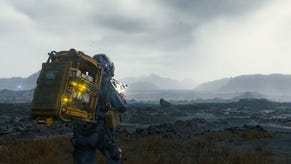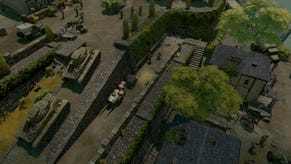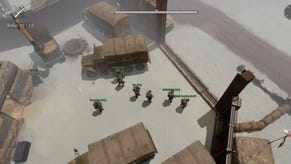I play Foxhole as a pacifist medic who refuses to carry a gun but the enemy doesn't seem impressed
Trust me, I'm sort of a doctor
Another explosion sends the bodies flying. "Has anyone been here long enough to tell me what the hell is going on!?" the sergeant yells. He sounds annoyed. The field hospital is gone, probably blown to pieces. Troops keep wandering north and disappearing from view, only to come flying back as airborne cadavers moments later. The number of corpses and spilled backpacks on the road imply that someone in battalion headquarters (if such a place even exists) has made a terrible decision. If the Colonial forces want to win the persistent online war of Foxhole, suggests the sergeant with his many irritated noises, then someone needs to piece these dying fools together. As the only medic in a 500 metre radius, that means me.
Foxhole is a game of top-down multiplayer war on both a grand and granular scale, where every bullet you fire has been made by another soldier somewhere far away. It evokes the legendary battles of Eve Online or Planetside 2, albeit in an alternate universe World War II. And it's as much about infighting over logistics as it is about getting caught in a friendly troop's wayward grenade blast. In a previous outing, Sin called it a game in which you must "derive satisfaction from doing helpful things without recognition."
That doesn't mean throwing your life away at the front. It means moving metal girders from one town to another, refuelling abandoned vehicles, dismantling tank traps, and refilling old trenches with soil. Your success as a frontline soldier hinges on the thankless work of players who just want the roads to be neat and tidy, as if the town of "Scurvyshire" might lose a Village of the Year competition if it's not kept clean. The logistics players in this game are so organised, they once went on strike.
But more recently, it got an infantry update that adds anti-tank guns for any poor sods facing a column of armoured vehicles, as well as two new tanks for said sods to panic-fire upon. But all that is very violent. I'm more interested in the expanded role that medics play on the battlefield since my last adventures back in 2017. There are a lot of useful roles to adopt at the front - a mortar operator, a spotter, an ammo distributor - all of them gun-toting and ready to fire off a few rounds if needed. But I'm a doctor, not a fighter, as I have frequently yelled toward enemy lines. That does not seem to have any effect on the number of bullets that whizz past my skull. Nevertheless, I decide not to carry a gun as I play.
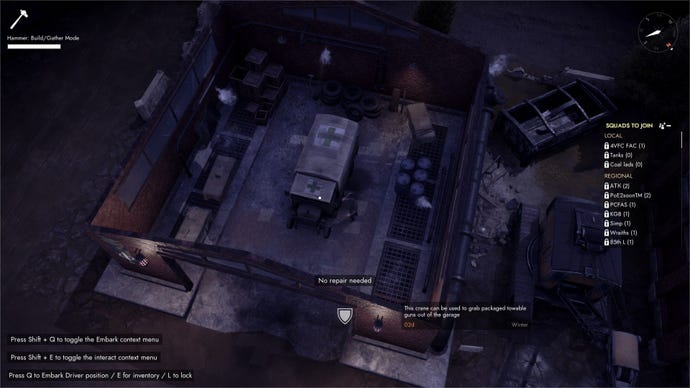
The general loop will be familiar to anyone who's played a similar medical role in first-person shooters like the hectic dumbassery of Battlefield V or the excellently tense Hell Let Loose. You equip yourself with trauma kits and plasma at the spawn point (usually a small town headquarters) and use those to revive fallen friends. You also stock up on a first aid kit and bandages, useful for wrapping up wounds of soldiers, who often bleed so heavily it looks like they've fallen in a vat of cherry jam. For added drama, you can also heft fallen warbuds onto your shoulders and hoof it as fast as possible away from the gunfire, like a true Forrest Gump. This shoulder-slinging is something even non-medics can do, and it feels very heroic, even if it gets you killed quite a lot.
But those are just the basics of the battlefield. There's one other very fun medic responsibility - the saving of "critically wounded soldiers". These are rare bodies that spring up following a soldier's death, hard to spot and even harder to retrieve when the artillery shells are falling. They aren't players at all, but little harvestable dudes almost indistinguishable from your online pals. Bringing these hurt NPC folk to field hospitals will see you dump them in a bed as a "patient" and (following a countdown timer) you can discharge them and harvest them for "shirts".
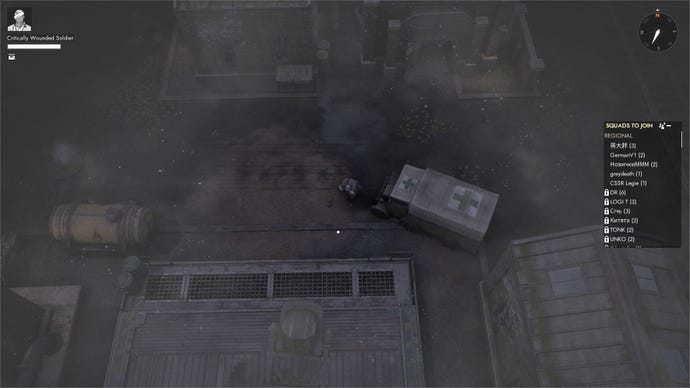
These shirts aren't just clothes. They're used all over the map as respawn tickets for real life players. So by grabbing these groaning troops on death's door (sometimes even using an ambulance to transport them across the map) you're essentially saving a few handy respawns. I like to think of the final moments of this process as sadly picking up the laundry of fallen fighters, like Sgt Malarkey does in Band Of Brothers.
But that's only if you spot such downed troops. And in my current predicament, I have bigger concerns. We have overextended into a new region, and everyone is running on fumes. It's snowing. The troops need ammo, winter clothes, and basic materials to build and repair the bunkers we need to dig in. The sergeant who briefly showed up to take charge has disappeared, either abandoning us to our fate or (more likely) killed by an errant mortar blast. The Wardens, our grey-uniformed enemy, have leaked through our porous lines and around our forward encampment. A host of 10 or 20 players are now dangerously close to being cut off.
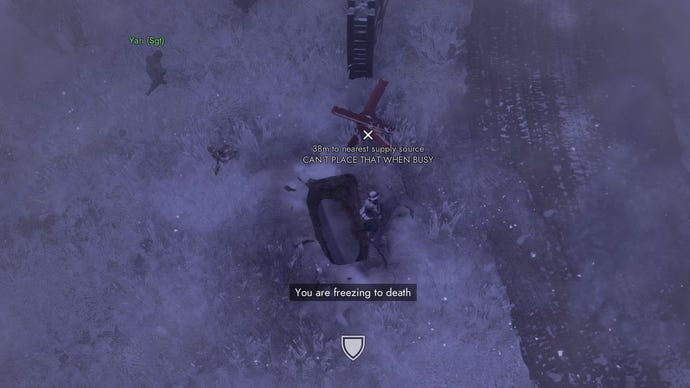
My best chance of saving lives, I decide, is not to heal those here with the meagre bandages I have. But to break away in my ambulance and come back with a stack of medical supplies, shirts, and thick coats. As I speed south, I pass a quiet Warden scout lying prone by a bridge. More signs of our impending encirclement. I check the map - a huge sprawl of geography that has greatly increased since the game's first appearance in 2017. "NEED WINTER CLOTHING," yells one note pinned to a sector near our front. They're not wrong. Stay too long exposed to the cold without decent clothes and your character will simply lie down and freeze to death. Another note reminds me of my other responsibilities: "Plasma, first aid, ammo," it begs. There is no way I can fit everything we need in one ambulance.
I arrive at the nearby town, picturesquely called "The Baths" despite being more like a set of freezing ruins. I hop out and start piling everything I can from headquarters into my ambulance. In minutes I'm back on the road, hopeful and happy that I'm not just delivering medical supplies but also a bunch of basic materials - the fundamental building blocks of a huge number of items. Happy, that is, until I run straight into the arse end of a Warden transport truck. And unlike me, the truck driver has the honour of being escorted through the settlement by an armoured car. We are just outside the settlement of "Loggerhead", which is fitting, because that is what the armoured car and I are about to come to.
The gunner fires at me and I dodge my ambulance behind the enemy logistics truck, trying to use his own teammate as cover. It works, but only for a moment. The armoured bulleteer zips around and fills my engine with lead. Time to abandon the vehicle, I think, and step out just in time to be shredded by the gunner's enthusiastic tat-tat-tat. I die alone, my mission a failure. Later, when I look at the map, I will notice that my army mates have long been surrounded. They will not survive the day.
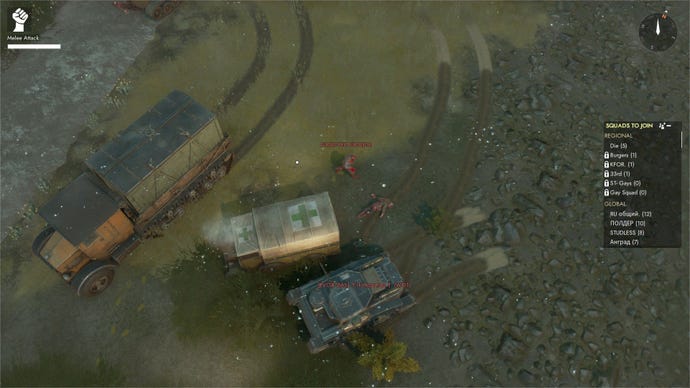
Not every medical emergency has been so ill-fated, though. In the next big fight I encountered, I scurried around the bombed-out buildings of an urban flashpoint, bringing my ambulance back and forth through bombed streets, and actually managed to save some of those "critically wounded" NPC soldiers I've mentioned. I even got to use my ambulance's siren horn to honk trucks and passing tanks out of my way. Don't they know a man is dying here! I need to harvest his linen!
When I wasn't healing folks, I put myself to use scuttling around like a rodent, picking up the ammo and medical supplies from the dead and bringing it back to base. "Whoever keeps bringing back the dead people's supplies," said some bystanding commander, "is the fucking king." A happy result of Foxhole's chaotic teamwork is that you feel like you can make a difference, even if you refuse to carry a gun. A medic, especially, is a gratifying job. You get to see your patients stand up and rush back into the fray, and many players pause to thank you, or even role play with groans of pain when they get struck by a blast of shrapnel.
Shell after shell hits that town, but I go on running around without a rifle, picking up all the bullets, radios, gas masks, and first aid kits I can find, squirreling it all back to the nearest bunker and dumping everything in a big box for fresh recruits to find. In this act, and in the act of bringing injured men home just so I can iron their shirts, I have discovered Foxhole's true nature. It is actually a game about recycling.
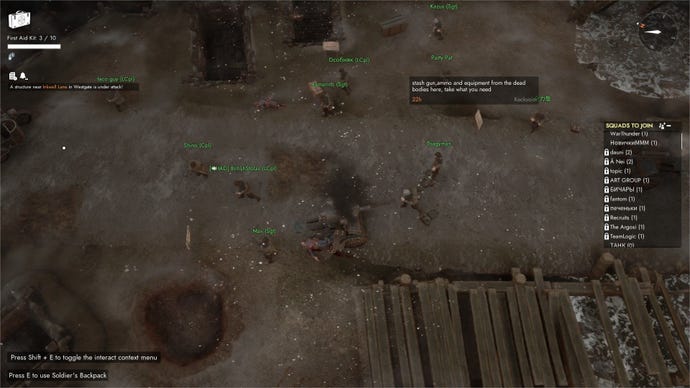
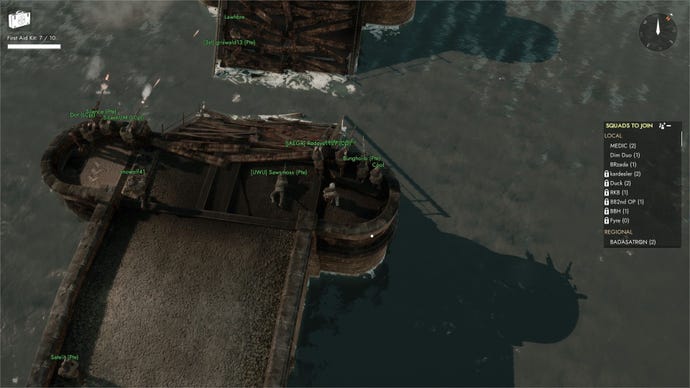
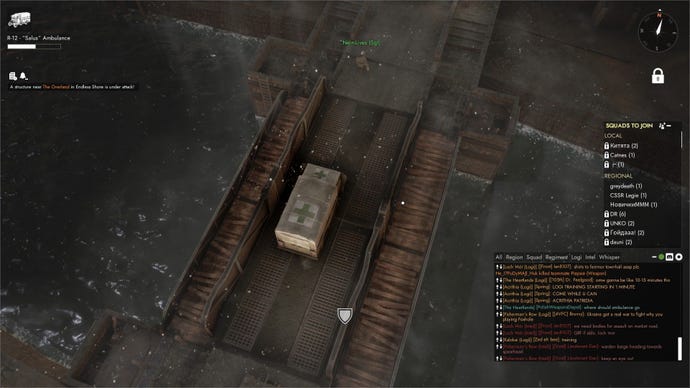
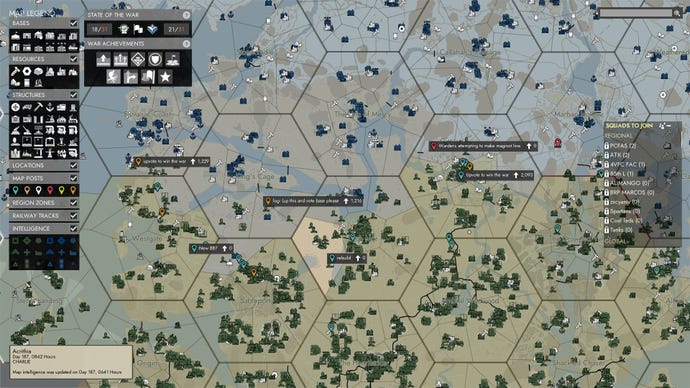
Some time after the urban battle I find myself on another medical run. This time I have a bigger truck as the ambulance just won't carry what I need. It's full of clean shirts and medical kits - badly needed in another village to the north. The map looks clean, there's no reason to be afraid. But out of the blue four Warden partizans appear by the roadside and shoot out my tires. They surround the car, and - forever lacking the gun that might save me from such scenarios - I do the only thing I can think of. I yell: "I surrender".
I clamber out of the truck and do a "hands-on-head" emote. They slowly approach me without firing. I invoke the Geneva convention and tell them everything. I am a doctor, I don't even carry a gun. They are doing a fine job, I insist, and are upstanding gentlemen. They seem to be very amenable and ask only that I unlock the truck full of supplies, which I assent to with gracious dignity, and barely any whimpering at all.
The truck is open. They inspect the contents and seem satisfied. Then one of the men in grey wonders aloud: "Is it bad to kill someone after they surrender?" It is an airy question, perhaps directed at his friends, or perhaps to a passing cloud. The Wardens aim their guns and fill my torso with bullets. I have only a few seconds to gasp with my dying breath: "Hey, you broke the rules. You broke the rules of war."
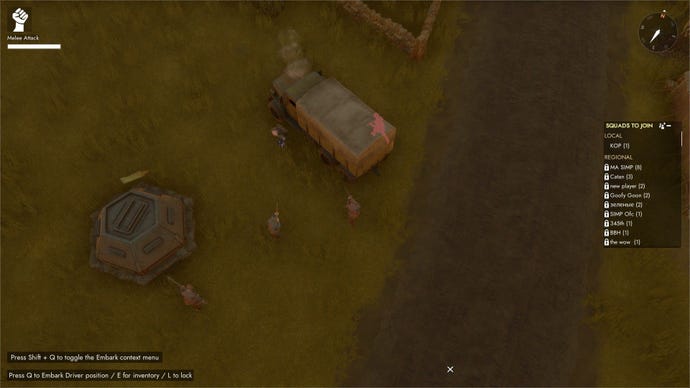
In this, Foxhole continues to be that rare type of game: a mucky multiplayer war full of great opportunities for role-playing, be that as a disastrous doctor, or any other war-time career. I chose a life as a medic this time. But you could easily be a quiet hero building railway lines as part of a crew of engineers, or captain the sea freighters that will deliver crates full of binoculars to the snipers who can actually make good use of them. In summer, the game will open up a whole new avenue of play by adding planes - each of them due to be piloted by real players. The unionised logistics players will no doubt be squinting at the cost of building and supplying such war machines. But me? I'm looking forward to a gloriously inaccurate drop behind enemy lines, and all the wounds I'll have to treat as a result.
